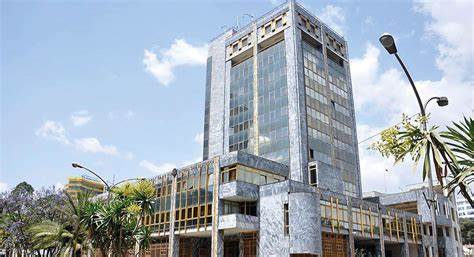A new audit of the National Bank of Ethiopia (NBE) has revealed serious financial troubles, including massive losses in foreign exchange dealings and gold trading, as well as rising government debt.
The audit was conducted by MSE Audit Service LLP for the financial year starting July 2022. It was part of conditions agreed with the International Monetary Fund (IMF), which required Ethiopia to audit its state-owned enterprises, including the central bank.
According to the audit report published on April 4, 2025, and approved late last month, the NBE ended the year with a negative reserve balance of nearly 1 billion birr. The loss was driven by 1.8 billion birr in forex-related losses in 2022 and 1.4 billion birr the year before.
These losses came from falling values in government bonds, lending to state-owned banks, buying gold at premium rates, and a weakened local currency.
The auditors also found that the NBE lost over 12 billion birr in forex transactions during the year. A similar figure was recorded the previous year. These losses were linked to high exposure to foreign currency assets and liabilities, and obligations to international financial institutions.
The report noted that recent reforms in the forex policy, introduced in July 2024, might increase instability in the banking system.
In its gold trading business, the NBE saw a drop in earnings. Gold sales fell from 22 billion birr in 2022 to 14 billion birr in 2023. Gold purchases also reduced by nearly half, from 27 billion birr to 15.5 billion birr, largely because the bank paid more than global prices to local suppliers.
Despite the challenges, the NBE managed to bounce back from operating losses in 2021 and 2022, recording a 588% jump in income to 9 billion birr in 2023. This was mainly from loan interest, deposits abroad, and service charges.
The audit further showed that general and administrative expenses dropped from 15 billion birr to 13 billion birr in 2023.
The NBE gave out 137 billion birr in loans to state banks and 15 billion birr to private banks last year. It earned 11 billion birr from forex services and another 852 million birr from other service charges.
By law, the NBE must transfer 20% of its net profit to its general reserves. Though still in the negative, the reserve improved by 64%, closing at minus 986 million birr.
The central bank’s net interest income reached 17.4 billion birr, up from 11.6 billion the year before. Its total assets also grew by over 25% to 833 billion birr. Of this, 583 billion birr was money owed by the government—mostly in the form of direct advances and bonds set to mature between 2034 and 2047.
The cost of printing currency also rose from 2.4 billion to 3.8 billion birr. Currency in circulation went up from 209 billion to 255 billion birr. The report also factored in about 60 million birr lost due to armed conflict in some parts of the country.
At the end of June 2023, Ethiopia’s forex reserves had dropped to 655 million birr. However, the NBE says things have improved since signing a deal with the IMF.
The report also disclosed that the NBE held shares in Afrexim Bank, Africa Reinsurance, and EthSwitch, valued at 913 million birr.
Notably, the bank received a USD 1 billion time deposit from Saudi Arabia in 2015 and another USD 500 million in 2019. The deposit carries a 3% interest rate. The UAE also gave a similar USD 1 billion time deposit in 2019 under the same interest terms.
The NBE’s authorised capital has been increased to 20 billion birr, up from just 500 million birr, following a new law passed by Parliament.
